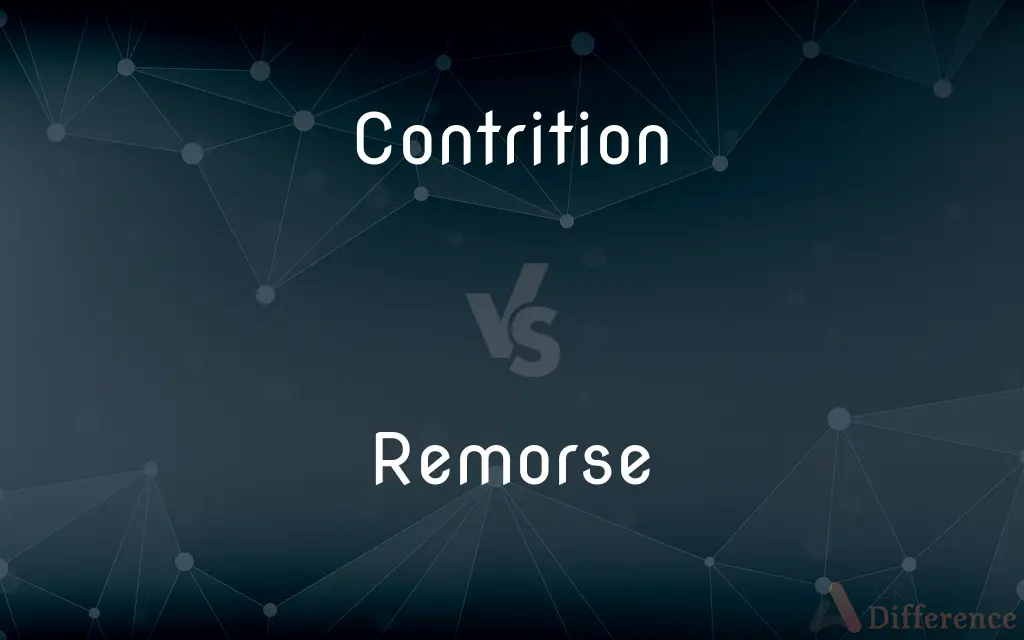Contrition vs. Remorse — What's the Difference?
By Tayyaba Rehman & Fiza Rafique — Updated on April 27, 2024
Contrition implies a deep spiritual regret aiming for repentance, whereas remorse is a strong feeling of sadness and guilt for past wrongs.

Difference Between Contrition and Remorse
Table of Contents
ADVERTISEMENT
Key Differences
Contrition is often associated with a moral or spiritual breakdown due to guilt from actions against one's beliefs or values, aiming for a transformation or repentance. Whereas remorse involves a deep emotional pain over past misdeeds without necessarily a connection to moral transformation.
Contrition is typically used in religious or formal contexts where the emphasis is on the desire to atone and make amends as part of personal or spiritual growth. On the other hand, remorse can be felt by anyone regardless of religious beliefs and usually pertains to personal guilt and regret.
Contrition involves an element of self-sacrifice and the desire to change one’s behavior fundamentally as a response to wrongdoing. Whereas remorse may not always lead to a change in behavior but does involve acknowledging one's mistakes and feeling genuine sadness about them.
Contrition is often public or ceremonial, part of confession rituals in many religions. In contrast, remorse can be a more private experience, not necessarily shared with others or part of a formal process.
Contrition might lead to proactive steps towards repairing the damage done and reconciling with affected parties. Whereas remorse, while it may inspire apologies, doesn’t always translate into corrective actions.
ADVERTISEMENT
Comparison Chart
Definition
Deep regret for sins aiming for repentance
Strong emotional regret for past actions
Context
Often religious or formal
Generally personal or informal
Result
Seeks to change and atone
May not lead to change in behavior
Emotional Depth
Spiritual and transformative
Emotional and personal
Expression
Can be public or part of rituals
Usually private and introspective
Compare with Definitions
Contrition
Emotional sorrow for violating one's moral or ethical code.
His contrition led him to seek forgiveness from those he had wronged.
Remorse
Emotional response to realizing one's mistakes.
Her eyes filled with remorse when she saw the damage.
Contrition
A committed resolve to avoid future wrongdoing.
Her contrition prompted her to make amends to the community.
Remorse
An internalized reaction to unethical behavior.
Remorse kept him awake at night, reflecting on his actions.
Contrition
Deep spiritual repentance and the desire for atonement.
His contrition was evident when he volunteered at the shelter.
Remorse
Momentary regret that may or may not lead to actual change.
Her remorse was evident, but she continued her reckless behavior.
Contrition
A regretful recognition of past sins in religious contexts.
She expressed contrition during her confession.
Remorse
A strong feeling of guilt and regret for past deeds.
He felt remorse after lying to his friend.
Contrition
The state of feeling remorseful and penitent.
Contrition washed over him as he returned the stolen goods.
Remorse
Personal sadness linked to an acknowledgement of harming others.
He showed genuine remorse during the apology.
Contrition
In Christianity, contrition or contriteness (from the Latin contritus 'ground to pieces', i.e. crushed by guilt) is repentance for sins one has committed.
Remorse
Remorse is a distressing emotion experienced by an individual who regrets actions which they have done in the past that they deem to be shameful, hurtful, or wrong. Remorse is closely allied to guilt and self-directed resentment.
Contrition
Sincere remorse for wrongdoing; repentance.
Remorse
Deep regret or guilt for a wrong committed
They were filled with remorse and shame
Contrition
The state of being contrite; sincere penitence or remorse.
Remorse
Moral anguish arising from repentance for past misdeeds; bitter regret.
Contrition
(obsolete) The act of grinding or rubbing to powder.
Remorse
(Obsolete) Compassion.
Contrition
The act of grinding or ribbing to powder; attrition; friction; rubbing.
The breaking of their parts into less parts by contrition.
Remorse
A feeling of regret or sadness for doing wrong or sinning.
Contrition
The state of being contrite; deep sorrow and repentance for sin, because sin is displeasing to God; humble penitence; through repentance.
My future days shall be one whole contrition.
Remorse
(obsolete) Sorrow; pity; compassion.
Contrition
Sorrow for sin arising from fear of damnation
Remorse
The anguish, like gnawing pain, excited by a sense of guilt; compunction of conscience for a crime committed, or for the sins of one's past life.
Remorse
Sympathetic sorrow; pity; compassion.
Curse on the unpardoning prince, whom tears can drawTo no remorse.
But evermore it seem'd an easier thingAt once without remorse to strike her dead.
Remorse
A feeling of deep regret (usually for some misdeed)
Common Curiosities
Can remorse lead to contrition?
Yes, intense feelings of remorse can sometimes evolve into contrition, especially if there is a deep reflection on moral values.
What triggers contrition in a person?
Contrition is often triggered by a realization of having violated deeply held moral or spiritual beliefs.
How does remorse differ in its expression from contrition?
Remorse is generally a more private and personal feeling of guilt, not necessarily expressed publicly or within formal frameworks.
Are there any physical manifestations of contrition or remorse?
Both emotions can manifest physically through tears, a solemn demeanor, or other expressions of sadness and regret.
What is the primary emotion associated with contrition?
Contrition primarily involves repentance and the desire for moral and spiritual cleansing.
Is contrition necessary for forgiveness in religious contexts?
In many religious teachings, contrition is considered essential for obtaining forgiveness from divine entities.
Can a person feel remorse without feeling contrition?
Yes, one can feel remorseful for their actions without necessarily experiencing the spiritual repentance associated with contrition.
How do contrition and remorse affect relationships?
Both emotions, when genuinely felt and expressed, can lead to healing and the restoration of trust in relationships.
Is contrition more about the self or others?
While contrition includes an element of self-reflection, it is largely about making amends and reconciling with others.
Can children experience genuine contrition?
Yes, children can experience contrition, particularly in contexts where they are taught about moral values and the importance of atonement.
Does remorse always lead to corrective action?
No, while remorse involves feeling regretful, it does not always result in behavioral changes or corrective actions.
Which is considered deeper, contrition or remorse?
Contrition is typically considered deeper as it involves a spiritual element and a commitment to change.
What role does culture play in feelings of contrition and remorse?
Cultural norms and values significantly shape how individuals experience and express both contrition and remorse.
Is remorse a necessary step towards personal growth?
While not sufficient alone for personal growth, remorse can be a critical first step in the process of self-improvement and ethical development.
How does one demonstrate genuine remorse?
Genuine remorse can be demonstrated through sincere apologies, taking responsibility for one's actions, and making efforts to rectify the harm done.
Share Your Discovery

Previous Comparison
Trench vs. Canal
Next Comparison
Tongs vs. TweezersAuthor Spotlight
Written by
Tayyaba RehmanTayyaba Rehman is a distinguished writer, currently serving as a primary contributor to askdifference.com. As a researcher in semantics and etymology, Tayyaba's passion for the complexity of languages and their distinctions has found a perfect home on the platform. Tayyaba delves into the intricacies of language, distinguishing between commonly confused words and phrases, thereby providing clarity for readers worldwide.
Co-written by
Fiza RafiqueFiza Rafique is a skilled content writer at AskDifference.com, where she meticulously refines and enhances written pieces. Drawing from her vast editorial expertise, Fiza ensures clarity, accuracy, and precision in every article. Passionate about language, she continually seeks to elevate the quality of content for readers worldwide.














































